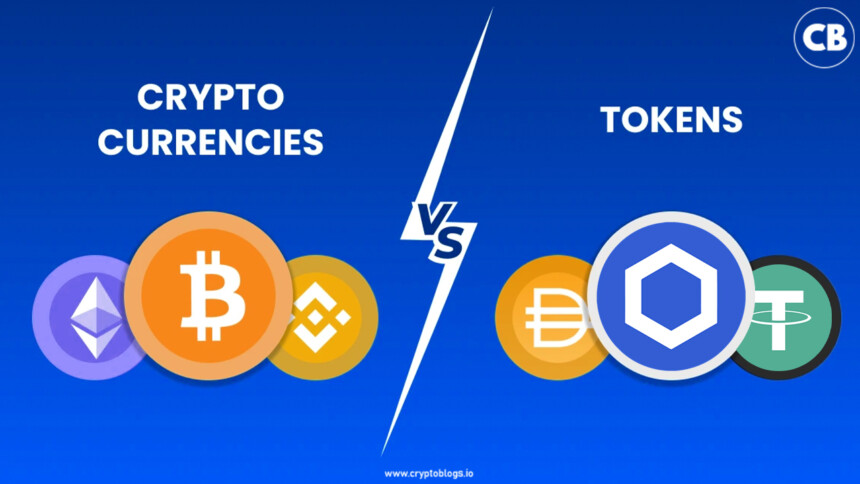Exploring a world of cryptocurrencies where groundbreaking digital assets like Bitcoin and Ethereum are revolutionizing the financial landscape with their innovative blockchain technology can be thrilling and fun.
But don’t be fooled, this dynamic space is not only dominated by these crypto giants. A new wave of digital currency is on the rise of tokens, which are not only challenging the status quo but also redefining the game.
While cryptocurrencies have already disrupted traditional finance systems and paved the way for a new era of digital wealth, these emerging tokes are opening doors to voting rights, access to exclusive services, and even physical goods.
The question remains, in this thrilling battle of decentralized efficiencies versus versatility between these digital assets, who will emerge victorious?
In this article, we will explore the unique roles of these two crypto pairs and uncover the hidden opportunities that await you.
Let’s explore this journey together.
What are Cryptocurrency Coins?
Crypto coins are electronic currencies that run on separate, autonomous blockchains. They are the fundamental building blocks of these systems and act as their internal currencies.
Every coin has its own blockchain, which is a distinct online ledger that keeps track of all transactions done with that specific coin.
For example, the Bitcoin blockchain powers Bitcoin, the Ethereum blockchain powers Ethereum, and so on. Because of its own autonomy, each currency is able to have unique features and regulations, which adds to the ecosystem’s diversity and complexity.
Litecoin, sometimes described as the silver to Bitcoin’s gold; Ethereum, the first and most widely recognized cryptocurrency Ripple, a coin made for quick and affordable worldwide payments; and Bitcoin, are a few examples of prominent coins.
What are Tokens?
Tokens are digital assets that function on current blockchains. In contrast to coins, which possess autonomous blockchains, tokens capitalize on the framework of well-established networks, typically Ethereum’s.
Smart contracts, which are self-executing contracts with the conditions of the agreement explicitly put into code, are used for creating and maintaining tokens. Because of this, a great deal of automation and customization is possible, allowing tokens to stand for a variety of resources and services.
A few well-known tokens are Uniswap, which runs the Uniswap decentralized exchange, Chainlink, which powers a decentralized oracle network, and Binance Coin, which is utilized to pay trading fees on the Binance platform.
Also Read: What is Tokenomics? Inflationary & Deflationary Tokens
Crypto Coins vs. Tokens: Key Differences
Tokens and coins have quite different functions and purposes. As we have covered, coins are a type of virtual money that are the native currencies of the blockchains in which they exist.
Here are some key differences
| Crypto Coins | Tokens |
|---|---|
| They are exchanged on cryptocurrency exchanges and utilized for transactions within their blockchain network. | Conversely, tokens have more applications and run on already-existing blockchains. They can stand in for resources or conveniences like the ability to vote, use services, or even tangible items. |
| Their main purpose is to make peer-to-peer transactions easier, providing a decentralized substitute for conventional fiat currencies. | A token could stand for a digital artwork, a platform membership, or a portion of a business. Initial coin offers (ICOs) frequently use tokens as a means of funding initiatives and enabling decentralised applications (DApps). |
| Coins can completely change how we transfer money by providing more affordable, quicker, and secure options than current systems. They might also act as a buffer against volatility in the economy and price increases. | Tokens are spurring creativity in fields including social networks, playing video games, and decentralised finance (DeFi) by making it possible for DApps to be created. |
Importance of Crypto Coins
In the cryptocurrency realm, coins and tokens are very important since they each make a distinct contribution to the ecosystem’s expansion and operation.
Crypto Coins are essential for enabling transactions and value transfer because they are the native currencies of the blockchains in which they exist.
They provide a decentralized substitute for conventional fiat money, allowing for peer-to-peer trades without the use of middlemen.
A new era of digital banking has been ushered in by coins like Ethereum and Bitcoin, which have upended established financial institutions and provided quicker, less expensive, and more secure means of exchanging wealth.
Importance of Tokens
Conversely, tokens make use of the infrastructure that coins offer to develop cutting-edge services and apps. They stand for a variety of benefits and resources, including the ability to vote, access to services, ownership of tangible objects, and more.
Decentralized applications (DApps) and initial coin offerings (ICOs) rely on tokens to propel innovation across multiple industries and expand the potential of blockchain technology.
Tokens and coins combined make up the core of the cryptocurrency ecosystem. They live in harmony together, each with their own function and potential.
Comprehending their significance is essential to fully grasping the extent of the cryptocurrency industry and the revolutionary possibilities of blockchain technology.
Conclusion
Conversely, tokens make use of the infrastructure that coins offer to develop cutting-edge services and apps. They stand for a variety of benefits and resources, including the ability to vote, access to services, ownership of tangible objects, and more.
Decentralized applications (DApps) and initial coin offerings (ICOs) rely on tokens to propel innovation across multiple industries and expand the potential of blockchain technology.
Tokens and coins combined make up the core of the cryptocurrency ecosystem. They live in harmony together, each with its own function and potential. Comprehending their significance is essential to fully grasp the extent of the cryptocurrency industry and the revolutionary possibilities of blockchain technology.







